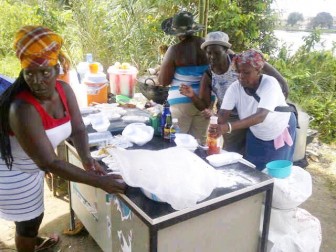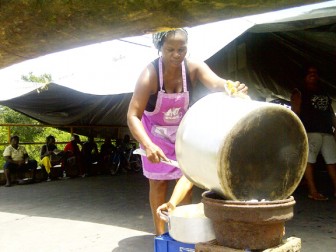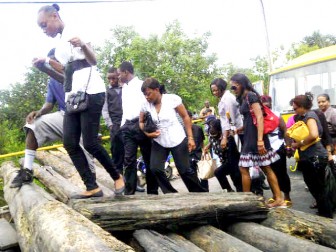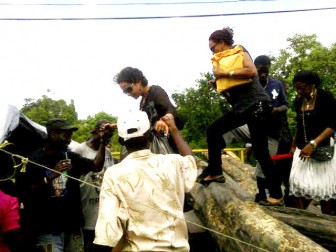She is surrounded by a group of women who are putting food into boxes on a table. Minutes later they invite persons to partake in the meal which has just been cooked on firesides.
As she shares the food she turns around, and the tenseness in her face can be seen underneath the perspiration. She later admitted that she was so tired she could sleep for hours, but she would continue the fight for as long as it took.

And 53-year-old secondary school teacher Fabeia Bowen is not the only woman who is prepared for the long haul in support of the Linden protest which turned ugly on the first day when three men were killed. For her and the many women who now cook and prepare food at various camps set up at the roadblocks in the town, the protest has gone well past the proposed hike of electricity rates, and is now a campaign for justice and equal rights.
They don’t want to call it a ‘struggle’ because for them the word has a negative connotation, and while many might be struggling to make it, they are a proud people who once given an opportunity would work for a living.
“We don’t want freeness as some people are saying,” another teacher, who declined to give her name said, adding that they prefer to say they are in “the fight” because it is a fight they intend to win and one that can only bring betterment to the township.
“This thing [rise in the electricity tariffs] is going to hurt everybody; in some homes only one person working… People saying we don’t want the raise but it is not that we don’t want it but we can’t pay it,” she said. She also commented that Linden does not receive electricity from the Guyana Power & Light.

The teacher said that two thousand jobs had been promised to Linden but these had not become a reality. Many families were not making it, she continued, and some persons were seeing their lights cut because they could not even afford the low rate being currently charged.
Even as she hurried off, the teacher noted that it is the children who are suffering as their parents are forced to leave them on their own as they travel to the interior in search of jobs.
“In the school system there are a lot of children on their own, and they cannot keep up because they have no parental guidance.”
And so it is the women who are seen at each road block from as far as Bamia, some in the scorching sun others in the tents erected facing the heat of the makeshift firesides as they pool their cooking skills to create meals for those supporting the action. While it was the men who lifted the huge logs and debris to make the road blocks, it is the women who are supporting them with words, a drink of water and a plate of food.
The women can be seen walking the dusty streets with bags laden with greens and foodstuff, or hitching rides on cycles.
‘Helping our men’
“I believe in the truth, I believe in justice, I believe in fair play and a level playing field, and I am here to assist the men because in my view men don’t help men, men help women, so we have to be out here to help our men,” said Bowen as she sat down wearily to eat the smallest portion of food.
Bowen wants to ensure that the men get food, “and at least some water; we not going to drink because they have to be in the battle front…”

She told this newspaper that she is in charge of the two camps on the Wisroc side of the bridge connecting Wismar and McKenzie. Unlike the other camps the food boxes at her camp are cut in half, so that they can be used for two persons, in an effort to conserve the boxes. And it is she who people turn to when something run short. This became evident when in the middle of the interview with the Sunday Stabroek someone informed her that the oil had run out.
On the first night of the protest Bowen was at home when her husband, 56-year-old Reuben Bowen, called and informed her that he had been shot and the following day she travelled with him to the city where he was admitted to the Georgetown Public Hospital (GPH) with a bullet in his left knee.
From that day on she made the daily trip between Linden and Georgetown supporting her husband, but also supporting the protest. “I travelled every day; I went with him in the ambulance, that was a no good because the ambulance is like a shak-shak – it make you more ill than anything else,” she said revealing that her husband had been discharged last Tuesday on his birthday.
She leaves the campsite at around 1 am each day, but she is back very early to cook breakfast, “because our men need to be taken care of because during the night they remain here watching over to ensure everything is okay.” Bowen said should they discontinue the protest without any results then the three men killed would have lost their lives in vain, “and we can’t afford that and so I am prepared for the long haul.”
“In fact, we past light… we are looking for justice for the dead, compensation for the injured,” she said, and she had some choice words for the government whom she described as being “faceless, heartless, and gutless…”
With six children, the school teacher, who is two years from retirement, said only two of them “have real jobs and it is not that they are not qualified, they can’t find jobs. I worked and send them to school and now they can’t find proper jobs.”

Should the Lindeners allow what she described as the “tyrannical” hike in the electricity rate, the women would have to do some “undignified things” to pay the increase in the rate. Another woman was not as modest as she told this newspaper that “I would have go and sell me body to pay.”
According to Bowen she ensures that her family conserves the electricity and is not into wastage. She said the hike in the rates would also see persons stealing electricity as is done in other parts of the country with some even risking their lives “just to get a little comfort.“
“I pay a bill every month and I pay it promptly, I pay three thousand seven hundred dollars every month and I turn off my lights, I conserve,” she said.
“We have a lot of women that their husbands died, who are pensioners from the bauxite industry who received cheap electricity because of their contributions to the bauxite company and the development of this region. This is an industrial town and there are certain amenities that goes along with it, and this is one; they already take away water from us,” she said.
She noted that the bauxite company is still operating and whoever is control should be made to provide cheap electricity to the township.
‘Unable to pay’
Forty-seven-year-old Simone Griffith is in charge at the camp set up at the Kara Kara Bridge and she also does not take the responsibility lightly. She has closed her small shop in order to be out at the bridge because she would be unable to pay the $12,000 a month she estimates she would have to pay with the hike.
“Added to that I have other bills, like Courts, and then I does tek things from people to turn over in the shop and when I finish pay sometimes I don’t even get nothing,” she said.
She has three children, two of whom are of school age, and her shop “can barely support the family.“
“I am supporting the struggle because is all a we in it, I gat to pay the bill, you gat to pay…” she said. Like Bowen she feels it is the women‘s duty to ensure that the men get something to eat and “share among each other with love.”
For a few days she cooked at home and took the food to the tent, but “it was hard so we decide to do the cooking right here and I prepare to stay here until we hear something positive…”
She explained that the only jobs in Linden are working in a cook shop or selling. “All dem lil school girls just come out a school they have to study to go in somebody kitchen or a lil cook shop to ask for a job, and is not nice when you work so hard to receive whatever certificate you receive in schools to get dem sort a job,” she said.
She was forced to discontinue the interview at this point as she ran off to tend to a pot of burning rice.
About two feet away forty-four-year-old Colette Griffith was struggling to strain some coconut milk, and sought this reporter’s assistance before granting the interview. She “hustles selling food on the road” and has two children, one of the school age but she still helps out her adult son because “I don’t want he go and thief.”
“Right now I just trying to live because is life I deh on the earth fuh but it very hard and if me ain’t fight I guh have to sell me body on the street,” she said.
The mother of two said it is not just the electricity tariff that is the issue, but the deplorable state of the roads. Many years ago she and others occupied some swampy land that has today turned into a small community, and she cannot now pay the $550,000 that is being sought for the land she her small house sits on.
“Is still swamp land, although it build up because when rain fall it flood out and you could believe is piece, piece I build me house. You could believe I is forty-four and me ain’t even get a kitchen yet…because I hustling off the road and me ain’t begging, me ain’t thieving and me ain’t robbing,” she said.
Like the many other women who preferred not to be interviewed, she vowed to continue to support the struggle. “I might not be under the tent but I supporting the struggle,” one woman said as she took some peas to be added to the pot under one of the tents facing the blazing sun.





